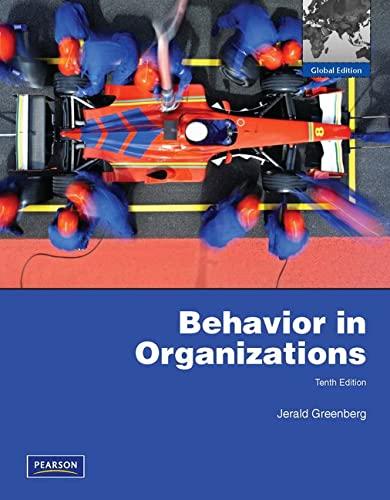Contrary to popular belief, Howard Schultz was not the founder of Starbucks. Instead, Starbucks Coffee, Tea and
Question:
Contrary to popular belief, Howard Schultz was not the founder of Starbucks. Instead, Starbucks Coffee, Tea and Spice, as it was known, began in 1971 as a small coffeehouse in Seattle, the vision of three other men, Jerry Baldwin, Zev Siegel, and Gordon Bowker. A decade later, Schultz, who was selling kitchen equipment in New York City at the time, became curious when lots of coffee roasting equipment was being purchased by this small shop in Seattle. This led Schultz to Seattle to see what was going on. Excited by what he found in this fledgling business, Shultz envisioned having a chain of friendly, Italian-style espresso bars across the United States. At first, Baldwin, Siegel, and Bowker didn’t share this image, but Schultz pushed to join the company so he could learn the business;
the threesome eventually hired Schultz as Starbucks’
marketing manager. After about a year, and the company now with four stores, Schultz convinced his bosses that thinking much larger might not be such a crazy idea. A few years later, Schultz raised $1.25 million and bought the franchise from its three owners. From 1987 to 1992 Schultz grew Starbucks to 150 stores, and by 1990 the company began turning a profit. The template for Starbucks as we know it today—serving 10 million customers a week from 3,300 stores around the world—
was established.
Schultz is convinced that a huge part of the company’s success rests on his commitment to detail, making sure that every little thing is done right, even the look and feel of the stores. As he put it, “We took things so fastidiously in terms of creating the visual, nonverbal cues of what it means to be in a Starbucks store.” Not all CEOs maintain such a careful watch over such seemingly minor details, but Schultz has insisted over the years that nothing is too minor for his attention. This is not to say that he insists on having things his way. Far from it! Schultz always has been committed to gathering everyone’s ideas and treating his employees fairly so that they are interested in sharing their ideas.
It cannot be said that Schultz’s ego is as large as his ambitions or his successes, as often is found among successful entrepreneurs. Although every detail at Starbucks reflects Schultz’s contributions, he always speaks of the company in collective terms, using we, us, and our instead of I, me, and mine. To him, it’s all about a team of people who collectively buy into the idea of having a great company by serving exceptional products to people with outstanding customer service. After all, people can buy coffee anywhere, so keeping them coming back to Starbucks (which its average customer does 18 times per month) requires listening to people—
customers and employees alike—and doing what it takes to keep them happy.
Years ago, for example, business at the typical Starbucks location slowed down later in the day, leading some stores to close around 7:30 P.M. In some locations, however, Schultz discovered that sales actually rose in the late afternoons and early evening hours. Visiting these stores, he discovered why. Apparently, customers started using the stores as meeting places. College students would assemble to study and businesspeople would gather for informal meetings there. Happy to accommodate them, these stores extended their hours and added food items, such as various pastries and now sandwiches, to the already extensive list of beverage offerings on the menu. This kind of flexibility was in keeping with Schultz’s interest in building the business by building successful relationships. To him, it’s not about the coffee, but all about people.
Questions for Discussion
1. What particular Big Five personality traits and what elements of core self-evaluation appear to characterize Schultz?
2. What evidence, if any, points to the possibility that Schultz have a high level of achievement motivation?
3. How do you think Schultz’s social skills may have contributed to the success of Starbucks? What other special skills and abilities do you think he has that have helped the company grow and prosper?
Step by Step Answer:






